高考英语介词用法
- 格式:pdf
- 大小:918.20 KB
- 文档页数:8
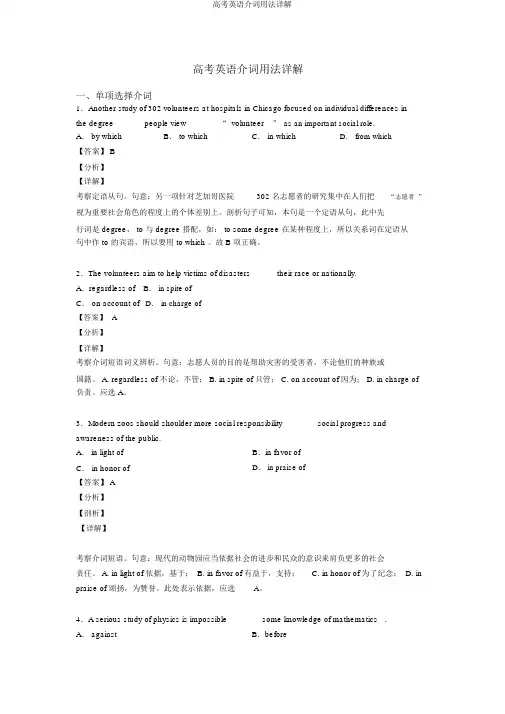
高考英语介词用法详解一、单项选择介词1.Another study of 302 volunteers at hospitals in Chicago focused on individual differences inthe degree ______ people view“ volunteer” as an important social role.A. by which B. to which C. in which D. from which【答案】 B【分析】【详解】考察定语从句。
句意:另一项针对芝加哥医院302 名志愿者的研究集中在人们把“志愿者”视为重要社会角色的程度上的个体差别上。
剖析句子可知,本句是一个定语从句,此中先行词是 degree, to 与 degree 搭配,如: to some degree 在某种程度上,所以关系词在定语从句中作 to 的宾语,所以要用 to which 。
故 B 项正确。
2.The volunteers aim to help victims of disasters _____ their race or nationally.A.regardless of B. in spite ofC. on account of D. in charge of【答案】【分析】【详解】A考察介词短语词义辨析。
句意:志愿人员的目的是帮助灾害的受害者,不论他们的种族或国籍。
A. regardless of 不论,不管; B. in spite of 只管; C. on account of 因为; D. in charge of 负责。
应选 A。
3.Modern zoos should shoulder more social responsibility _______ social progress and awareness of the public.A. in light of C. in honor of 【答案】 A 【分析】【剖析】【详解】B.in favor of D. in praise of考察介词短语。
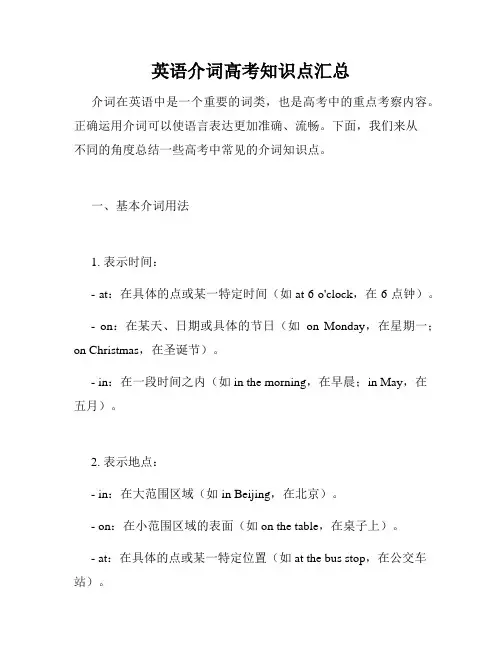
英语介词高考知识点汇总介词在英语中是一个重要的词类,也是高考中的重点考察内容。
正确运用介词可以使语言表达更加准确、流畅。
下面,我们来从不同的角度总结一些高考中常见的介词知识点。
一、基本介词用法1. 表示时间:- at:在具体的点或某一特定时间(如at 6 o'clock,在 6 点钟)。
- on:在某天、日期或具体的节日(如on Monday,在星期一;on Christmas,在圣诞节)。
- in:在一段时间之内(如in the morning,在早晨;in May,在五月)。
2. 表示地点:- in:在大范围区域(如in Beijing,在北京)。
- on:在小范围区域的表面(如on the table,在桌子上)。
- at:在具体的点或某一特定位置(如at the bus stop,在公交车站)。
3. 表示方式、原因、目的等:- for:表示对某人或某事有利(如good for health,有益于健康)。
- by:通过某种方式或手段(如by bus,乘坐公交车;by the way,顺便说一下)。
- with:伴随某物或某人一起(如play with friends,和朋友一起玩)。
4. 表示动作的方向或位置:- to:表示朝着某处(如go to school,去学校)。
- from:表示从某处来(如come from China,从中国来)。
- into:表示进入某处(如go into the room,进入房间)。
5. 表示从属关系:- of:表示所属关系(如a friend of mine,我的一个朋友)。
二、固定搭配1. look forward to:期待- I'm looking forward to the summer vacation.(我期待着暑假的到来。
)2. be fond of:喜欢- She is fond of playing basketball.(她喜欢打篮球。
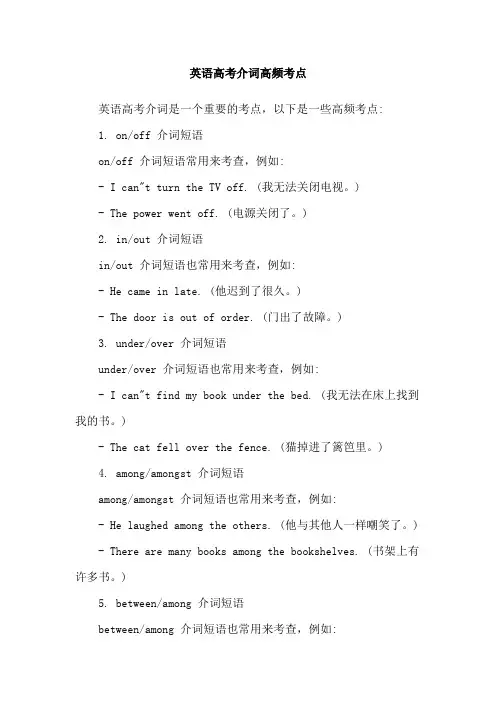
英语高考介词高频考点英语高考介词是一个重要的考点,以下是一些高频考点:1. on/off 介词短语on/off 介词短语常用来考查,例如:- I can"t turn the TV off. (我无法关闭电视。
)- The power went off. (电源关闭了。
)2. in/out 介词短语in/out 介词短语也常用来考查,例如:- He came in late. (他迟到了很久。
)- The door is out of order. (门出了故障。
)3. under/over 介词短语under/over 介词短语也常用来考查,例如:- I can"t find my book under the bed. (我无法在床上找到我的书。
)- The cat fell over the fence. (猫掉进了篱笆里。
)4. among/amongst 介词短语among/amongst 介词短语也常用来考查,例如:- He laughed among the others. (他与其他人一样嘲笑了。
) - There are many books among the bookshelves. (书架上有许多书。
)5. between/among 介词短语between/among 介词短语也常用来考查,例如:- I can"t find my keys between the sofa and the wall. (我无法在沙发和墙上找到我的钥匙。
)- The children played happily among the flowers. (孩子们在花丛中玩得很开心。
)这些介词短语在英语高考中常常会出现,考生需要熟练掌握它们的含义和用法,以便在考试中更好地应对。
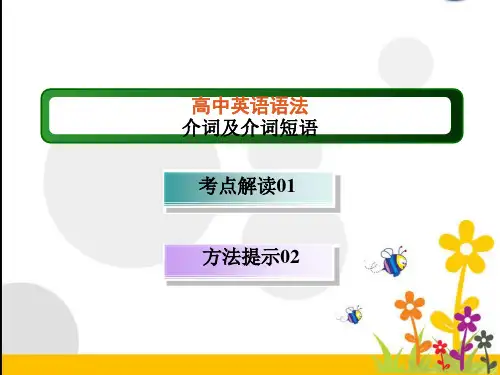
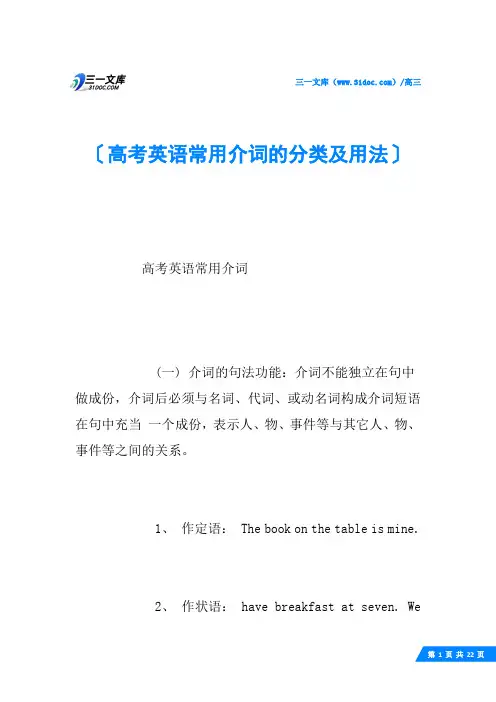
三一文库()/高三〔高考英语常用介词的分类及用法〕高考英语常用介词(一) 介词的句法功能:介词不能独立在句中做成份,介词后必须与名词、代词、或动名词构成介词短语在句中充当一个成份,表示人、物、事件等与其它人、物、事件等之间的关系。
1、作定语: The book on the table is mine.2、作状语: have breakfast at seven. We(表时间)They were late for meeting because of the heavy ; rain.(表原因) ;They started the machine by pressing the button.(表方法)3、作表语: My dictionary is in the bag.4、作宾语补足语: I found him in the office.(二) 1.表示时间的介词(1) in表示“在某一时间段”或“在某一时候”,如用在月、季、年份、时代、世纪等时间名词的前面,或用来泛指一天的某一段时间。
in也可以指“在……之后”,表示从说话起的若干时间内。
如: in July/summer/2000/ancient timesThe bus will be here in ten minutes.(2) on表示“在特定的某一天”,也可用于带有修饰语的一天的某个时间段之前。
如:on Saturday, on Saturday morning, on the morning of August 1st(3) at表示“在某一时间点”,或用来表示不确定的时间和短期的假日、时节等。
如:at six o#clock, at Easter(4) over, through (out)两者均指“经过的全部时间”。
如:Stay over the Christmas.(5) for与since:for表示动作或状态延续的全部时间长度,为“长达……”之意;since用于指从过去特定的某个时刻到说话时为止的一段时间;含有since时间短语的句子要用完成时,但含有for时间短语的句子不一定要用完成时。
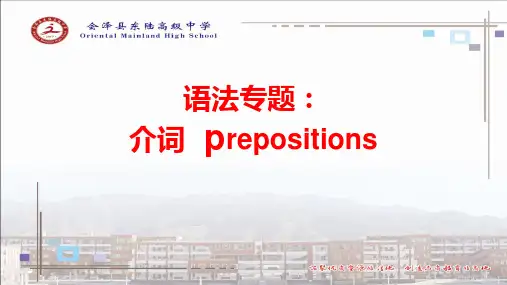
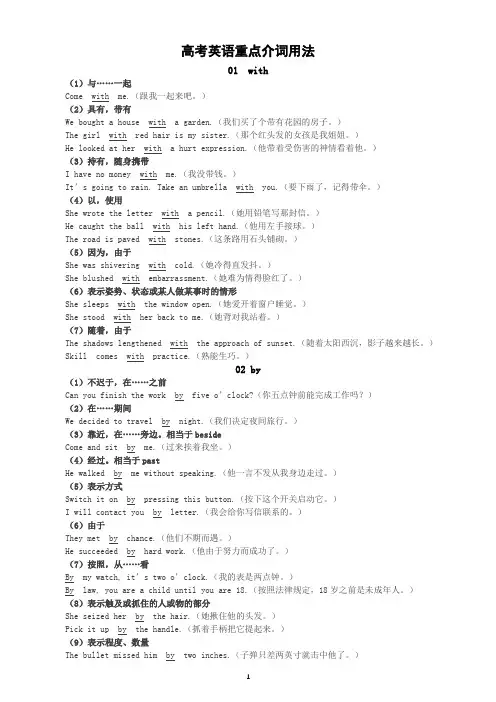
高考英语重点介词用法01 with(1)不迟于,在……之前Can you finish the work by five o’clock?(你五点钟前能完成工作吗?)(2)在……期间We decided to travel by night.(我们决定夜间旅行。
)(3)靠近,在……旁边。
相当于besideCome and sit by me.(过来挨着我坐。
)(4)经过。
相当于pastHe walked by me without speaking.(他一言不发从我身边走过。
)(5)表示方式Switch it on by pressing this button.(按下这个开关启动它。
)I will contact you by letter.(我会给你写信联系的。
)(6)由于They met by chance.(他们不期而遇。
)He succeeded by hard work.(他由于努力而成功了。
)(7)按照,从……看By my watch, it’s two o’clock.(我的表是两点钟。
)By law, you are a child until you are 18.(按照法律规定,18岁之前是未成年人。
)(8)表示触及或抓住的人或物的部分She seized her by the hair.(她揪住他的头发。
)Pick it up by the handle.(抓着手柄把它提起来。
)(9)表示程度、数量The bullet missed him by two inches.(子弹只差两英寸就击中他了。
)(1)在或向……较远的一边The road continues beyond the village up into the hills.(那条路经过村子后又往上延伸到群山中。
)(2)晚于,迟于It won’t go on beyond midnight.(这事不会延续到午夜之后。
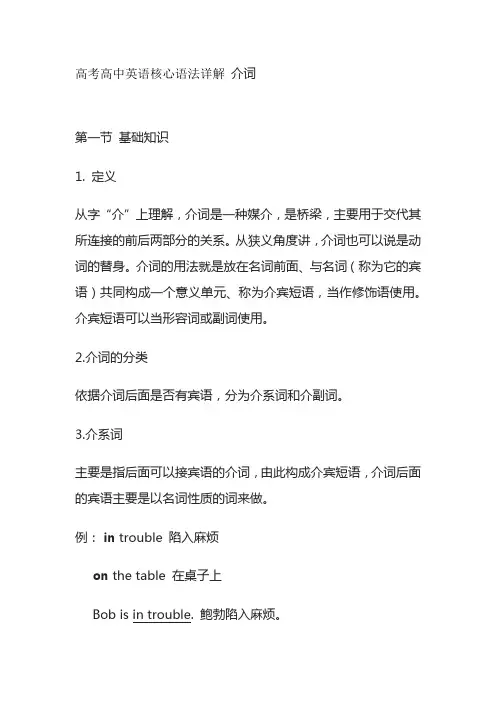
高考高中英语核心语法详解介词第一节基础知识1. 定义从字“介”上理解,介词是一种媒介,是桥梁,主要用于交代其所连接的前后两部分的关系。
从狭义角度讲,介词也可以说是动词的替身。
介词的用法就是放在名词前面、与名词(称为它的宾语)共同构成一个意义单元、称为介宾短语,当作修饰语使用。
介宾短语可以当形容词或副词使用。
2.介词的分类依据介词后面是否有宾语,分为介系词和介副词。
3.介系词主要是指后面可以接宾语的介词,由此构成介宾短语,介词后面的宾语主要是以名词性质的词来做。
例:in trouble 陷入麻烦on the table 在桌子上Bob is in trouble. 鲍勃陷入麻烦。
A red apple is on the table. 一个红苹果放在桌子上了。
4.介副词后面没有宾语,而是直接当副词使用。
Come in. 进来!The soldier stood up. 那名士兵站起来了。
5. 介副词和介词共同使用Mary went down to the basement. 玛丽去了地下室。
down 是介副词,后面没有宾语、直接修饰动词went;to 是介系词,后接名词词组the basement 当宾语、构成一个介词词组to the basement;went 看作不及物动词,后接介词to,再加宾语the basement;He has gone over to your office.over 是介副词,直接修饰动词has gone;to 是介词,后接名词词组your office 当宾语,构成一个介词词组to your office;gone看作不及物动词,后接介词to,再加宾语your office;第二节介系词在短语层面的应用介系词加宾语构成介宾短语后,主要出现在后修饰位置,其作用是交代中心词与其后的宾语之间的关系。
此时介宾短语也可视为形容词的性质。
例:a.2000 entry into the World Trade Organization2000年加入世贸b.an important earner of foreign exchange 赚取外汇的重要来源c. a boom in exports 出口增长第三节介系词在句子层面的应用1. 前状/后状:With the warm weather, the trees grow very well. 天气暖和,树木生长的很好!Kill two birds with one stone. 一石二鸟/一举两得。
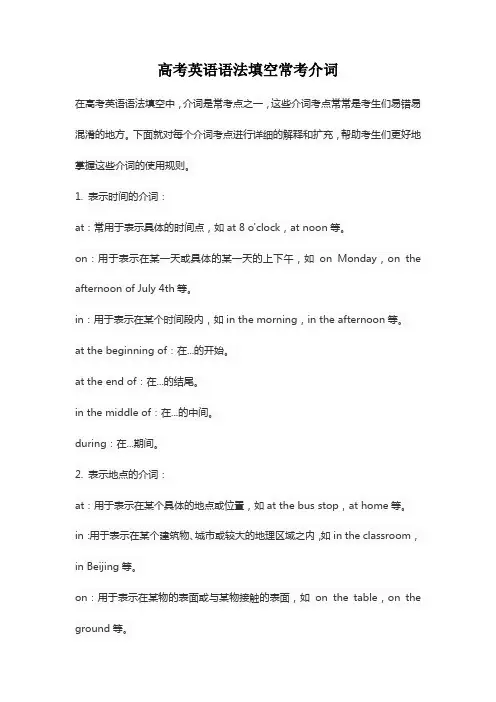
高考英语语法填空常考介词在高考英语语法填空中,介词是常考点之一,这些介词考点常常是考生们易错易混淆的地方。
下面就对每个介词考点进行详细的解释和扩充,帮助考生们更好地掌握这些介词的使用规则。
1. 表示时间的介词:at:常用于表示具体的时间点,如at 8 o'clock,at noon等。
on:用于表示在某一天或具体的某一天的上下午,如on Monday,on the afternoon of July 4th等。
in:用于表示在某个时间段内,如in the morning,in the afternoon等。
at the beginning of:在...的开始。
at the end of:在...的结尾。
in the middle of:在...的中间。
during:在...期间。
2. 表示地点的介词:at:用于表示在某个具体的地点或位置,如at the bus stop,at home等。
in:用于表示在某个建筑物、城市或较大的地理区域之内,如in the classroom,in Beijing等。
on:用于表示在某物的表面或与某物接触的表面,如on the table,on the ground等。
near:在...附近。
by:在...旁边。
between:在...之间。
in front of:在...的前面。
behind:在...的后面。
3. 表示方式的介词:by:用于表示通过某种方式或手段,如by bus,by phone等。
in:用于表示以某种状态或形式存在,如in English,in writing等。
on:用于表示在某种物体或表面上,如on the wall,on the table等。
4. 表示原因的介词:because of:由于...的原因。
due to:由于...的缘故。
这两个介词都可以用来表示原因,但略有区别。
because of更强调直接原因,而due to更强调因果关系。
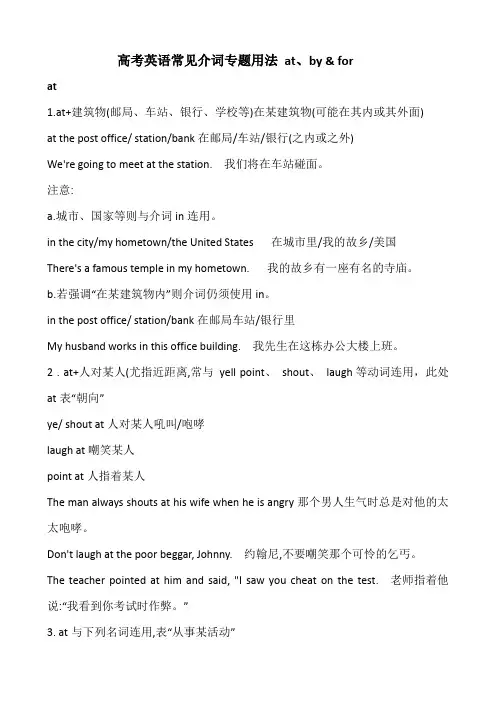
高考英语常见介词专题用法at、by & forat1.at+建筑物(邮局、车站、银行、学校等)在某建筑物(可能在其内或其外面)at the post office/ station/bank在邮局/车站/银行(之内或之外)We're going to meet at the station. 我们将在车站碰面。
注意:a.城市、国家等则与介词in连用。
in the city/my hometown/the United States 在城市里/我的故乡/美国There's a famous temple in my hometown. 我的故乡有一座有名的寺庙。
b.若强调“在某建筑物内”则介词仍须使用in。
in the post office/ station/bank在邮局车站/银行里My husband works in this office building. 我先生在这栋办公大楼上班。
2 . at+人对某人(尤指近距离,常与yell point、shout、laugh等动词连用,此处at表“朝向”ye/ shout at人对某人吼叫/咆哮laugh at嘲笑某人point at人指着某人The man always shouts at his wife when he is angry那个男人生气时总是对他的太太咆哮。
Don't laugh at the poor beggar, Johnny. 约翰尼,不要嘲笑那个可怜的乞丐。
The teacher pointed at him and said, "I saw you cheat on the test. 老师指着他说:“我看到你考试时作弊。
”3. at与下列名词连用,表“从事某活动”be at work上班,做事be at church做礼拜be at school 上学be at rest 休息You can go ask the manager now; he's at rest in the lobby你现在可以去问经理;他正在大厅里休息。
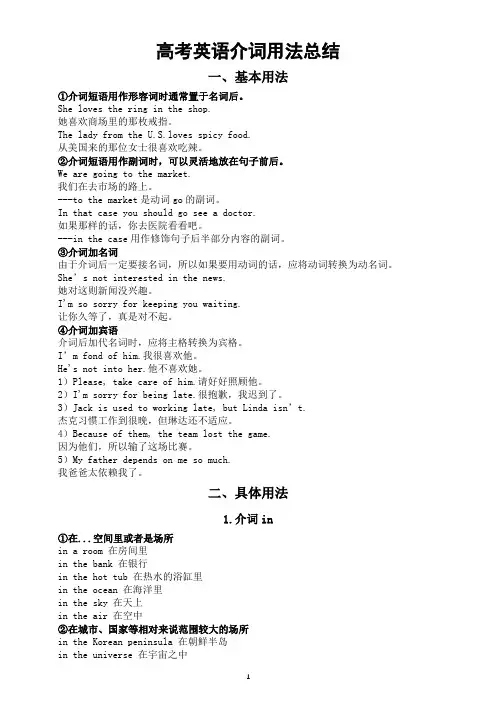
高考英语介词用法总结一、基本用法①介词短语用作形容词时通常置于名词后。
She loves the ring in the shop.她喜欢商场里的那枚戒指。
The lady from the U.S.loves spicy food.从美国来的那位女士很喜欢吃辣。
②介词短语用作副词时,可以灵活地放在句子前后。
We are going to the market.我们在去市场的路上。
---to the market是动词go的副词。
In that case you should go see a doctor.如果那样的话,你去医院看看吧。
---in the case用作修饰句子后半部分内容的副词。
③介词加名词由于介词后一定要接名词,所以如果要用动词的话,应将动词转换为动名词。
She’s not interested in the news.她对这则新闻没兴趣。
I'm so sorry for keeping you waiting.让你久等了,真是对不起。
④介词加宾语介词后加代名词时,应将主格转换为宾格。
I’m fond of him.我很喜欢他。
He's not into her.他不喜欢她。
1)Please, take care of him.请好好照顾他。
2)I'm sorry for being late.很抱歉,我迟到了。
3)Jack is used to working late, but Linda isn’t.杰克习惯工作到很晚,但琳达还不适应。
4)Because of them, the team lost the game.因为他们,所以输了这场比赛。
5)My father depends on me so much.我爸爸太依赖我了。
二、具体用法1.介词in①在...空间里或者是场所in a room 在房间里in the bank 在银行in the hot tub 在热水的浴缸里in the ocean 在海洋里in the sky 在天上in the air 在空中②在城市、国家等相对来说范围较大的场所in the Korean peninsula 在朝鲜半岛in the universe 在宇宙之中in the country 在乡村in the city 在城市里in Seoul 在首尔in Europe 在欧洲③年、月、季节等相对较长的时间in 2002 in the 1980sin March in springin winter in the 20th century④指早上、下午、晚上in the morning 在早上in the afternoon 在下午in the evening 在晚上对比: at noon 中午 at night 晚上⑤表示期间How could you finish he work in 3 days?这件事怎么可能在三天内完成?We can’t get to the island in 5 hours?我们不可能在五个小时之内到那个岛的。
高考英语介词和介词短语高考英语中,介词和介词短语是常见的语法结构,也是考查的重点之一。
掌握了介词和介词短语的用法和特点,不仅可以提升语法得分,还能够在阅读和写作中提升表达准确性。
下面将详细介绍高考英语中的介词和介词短语。
一、介词的基本用法介词是一种虚词,通常用于连接名词、代词、动词等词语之间的关系。
常见的介词包括in、on、at、of、to等。
介词通常位于名词短语的开头或结尾,用于表示时间、地点、方向、原因等关系。
1. 表示时间:at、in、on- at用于表示具体时间点,如at 7 o'clock(在7点钟)、at the weekend(在周末)。
- in用于表示较长的时间段,如in the morning(在早晨)、in December(在十二月)。
- on用于具体日期或某一天,如on Monday(在星期一)、on May1st(在五月一日)。
2. 表示地点:in、on、at- in用于表示大范围的地点,如in China(在中国)、in the park(在公园)。
- on用于表示小范围的地点,如on the table(在桌子上)、on the bus(在公交车上)。
- at用于表示具体点位或某一地点,如at the cinema(在电影院)、at the corner(在拐角处)。
3. 表示方向:to、from- to表示运动的目的地,如go to school(去学校)、travel to Paris (去巴黎)。
- from表示运动的起点,如come from Beijing(来自北京)、fly from London to New York(从伦敦飞往纽约)。
4. 表示原因:because of、due to- because of和due to都可以表示原因,但用法稍有不同。
because of 后接名词或名词短语,due to后接名词或代词。
例如:He failed the exam because of his laziness.(他考试失败是因为他太懒了。
高考英语高频率介词搭配1.动词+at at表示“指向某一目标,到达某地”:arrive at抵达 call at访问某地 catch at it 当场抓住 come at攻击 fire at向…开火 glance at瞟一眼 glare at怒目而视 grieve at 忧伤,knock at敲 laugh at嘲笑 look at看一眼 pull at拉扯 rejoice at对…高兴 smile at 向某人微笑 shoot at朝…射击 stare at怒目而视 thrust at刺向 tear at撕 tremble at颤抖 wonder at吃惊,work at工作。
例如:Don't let me catch you again at it.不要再让我当场逮住你。
We must shoot the arrow at the target.我们必须有的放矢。
They trembled at the sight of the peasant's spears.看到农民的梭标,他们阵阵发抖。
2. be+形容词/过去分词+at 其中at表示“情绪、情感的原因,或对某物具有某种感情”:be angry at恼怒于 be alarmed at对…保持警觉 be astonished at对…吃惊 be bad at不擅长 be clever at对某事很灵巧 be delighted at高兴 be disgusted at厌恶 be disappointed at 对…失望 be good at擅长 be impatient at对…不够耐心 be mad at狂热于 be pleased at 对…感到高兴 be present at出席 be satisfied at满意 be surprised at吃惊 be shocked at 对…非常震惊,be terrified at受到…的恐吓 be quick at对…很机敏。
高考英语专题复习《常考介词的用法及辨析》总结一表示时间的介词1. at, on, inat表示时间点,在某时某刻,泛指周末、圣诞节、复活节等时,也用at。
on 表示在具体的某一天、星期几或某天的上午、下午、晚上。
in 表示时间段,在某世纪、某年、某季度、某月以及泛指的上午、下午、晚上。
常见的固定表达有:at dawn/daybreak 在黎明时,at dusk 在傍晚,at noon 在中午,at night 在夜间,at midnight 在午夜,at Christmas 在圣诞节期间,at the age of five 在五岁时,on Sunday 在星期天,on Christmas Day 在圣诞节,in the 21st century 在21世纪,in the 1990s 在20世纪90年代,in winter 在冬季,in September 在九月,in the morning 在上午。
2.from, sincefrom表示时间的起点,可译作“从……”,多用于from...to/till...结构中。
since 表示“自从……以来(直到现在)”。
You can come any time from Monday to Friday.We have known each other since ten years ago.注意:for 和since 都常与完成时连用,但for 接时间段,since 接时间点。
如for two hours (持续)两小时,since last week 从上周直到现在。
3. for, during, throughfor后接一段时间,表示某事持续多久,多与完成时连用。
during 表示“在……期间”。
(3)through 表示“一直……,自始至终”。
She has been ill for several days.I went to France during the summer vacation.They worked hard through the winter.4. before, by, till, untilbefore表示“在……之前”,与after 相对。
of的用法一、前面的名词是主语的情况1、[表示所属关系](属于)...的eg:man of that time那个时代的人2、[表示关于](关于)...的eg:a long story of adventure一个很长的冒险故事二、短语是主语的情况1、[表示同位关系] eg:the city of Rome罗马市2、[表示性质、内容、状况等] eg:a look of pity令人哀怜的神色3、[表示在...方面] eg:be quick of eye眼快三、后面的名词是主语的情况1、[表示数量、种类] eg:three pieces of meat三块肉2、[表示部分或全部] eg:five of us我们中五个人3、[表示...中最突出的] eg:the hero of heroes最杰出的英雄4、[表示由...组成、做成] eg:a table of wood木头桌子5、[表示动作的主体] eg:It is clever of you to do so.你那样做真聪明。
With的用法1、以用同...由于和...一致赞成关于就talk with a friend 与朋友谈话learn farming with an old peasant 跟老农学习种田fight [quarrel argue] with sb. 跟某人打架[争吵辩论]2、说明表示动作的词表示伴随]随着和...同时change with the temperature 随着温度而变化increase with years 逐年增加be up with the dawn 黎明即起W-these words he left the room. 他说完这些话便离***间。
3、表示使用的工具手段用defend the motherland with one's life 用生命保卫祖国dig with a pick 用镐挖掘cut meat with a knife 用刀割肉4、明名词表示事物的附属部分或所具有的性质]具有; 带有; 加上; 包括...在内tea with sugar 加糖的茶水a country with a long history 历史悠久的国家5、表示一致]在...一边与...一致; 拥护有利于vote with sb. 投票赞成某人sympathize with sb. 同情某人be with sb. 赞成某人在某人一边6、[表示随身携带]在...身边Have you some money with you ? 你(身上)带钱了吗?Take an umbrella with you. 随身带把伞去。
高考英语语法介词用法点睛一、时间介词:at,in,on1.at的用法(1)时间的一点,时刻等,如:at 12∶00,at noon。
(2)较短暂的一段时间,可指某个节日或被认为是一年中标志大事的日子,如:at Christmas。
2.in的用法(1)表示在某个较长的时间内。
注意:当时间名词前被this,that,last,next,some,every等词限定时,通常不用任何介词。
(2)表示在将来的一段时间之后。
3.on的用法(1)用于表示具体的日子或一个特定的时间。
(2)用于表示特定的早晨、下午或晚上。
二、工具、手段、方式介词1.by,in,on三词都表示旅行的方式(1)不涉及交通工具的名词时用by,名词前不带冠词,如:by sea,by water,by land,by rail,by air。
(2)涉及交通工具的名词时用by,但名词须用单数,其前面不加冠词或任何修饰语,如:by bike,by taxi。
(3)当旅行方式涉及确定特指的交通工具时,用on或in,名词前应有冠词、物主代词、指示代词等修饰语。
2.with,by,in三词均可译为“用”,表示行为的工具、手段或方式(1)with用于有形的工具或身体某些器官之前,其后的名词多被冠词、物主代词等修饰。
(2)by,in,on,over,through等多用于无形的工具或方式、手段之前,如:by hand,in ink,on the telephone,over the radio,through the telescope。
注意:使用语言、原料、材料时用in表示。
三、介词的常见搭配1.at,from,in的有关表达(1)at:at dawn在黎明;at daybreak拂晓(2)from:from memory凭记忆(3)in:in a hurry匆忙2.of+抽象名词=形容词(1)of+great/much+抽象名词=very+形容词(2)of+no+抽象名词=not+形容词3.to与情感名词连用,表示“某种行动后产生的感觉”to+one’s+情感名词=to the+情感名词+of sb.介词范例:1.The Scottish girl ________ blue eyes won the first prize in the Fifth Chinese Speech Contest.A.by B.of C.in D.with【答案】选D【解析】句意:那个蓝色眼睛的苏格兰女孩在第五届汉语演讲比赛中获得了第一名。